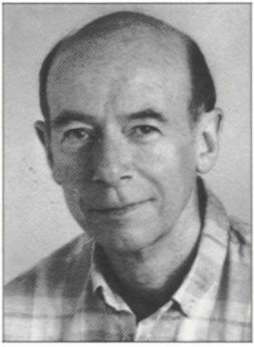Obituary
Michel Gauquelin
from Professor Hans Eysenck
published in The Independent Newspaper 20 June 1991 p.31
 Michel Gauquelin was trained as a psychologist and statistician, but is widely known for his revolutionary work on what he sometimes called neo-astrology or cosmobiology, i.e. the scientific measurement of the correlations between the position of certain planets at birth (Jupiter, Mars, Saturn in particular), an individual’s fame in various professions, and their personality. He published many books on his research, mostly of course in French, but some have been translated into English: his latest, Neo-Astrology: a Copernican Revolution, will be published by Penguin-Arkana at the end of August. Michel Gauquelin was trained as a psychologist and statistician, but is widely known for his revolutionary work on what he sometimes called neo-astrology or cosmobiology, i.e. the scientific measurement of the correlations between the position of certain planets at birth (Jupiter, Mars, Saturn in particular), an individual’s fame in various professions, and their personality. He published many books on his research, mostly of course in French, but some have been translated into English: his latest, Neo-Astrology: a Copernican Revolution, will be published by Penguin-Arkana at the end of August.
Gauquelin’s method of work was to extract details of the place and exact time of birth of famous sportsmen, soldiers, poets, actors etc from their birth records, and then look to see which planets had been in one of the “Gauquelin sectors” at that person’s birth – the Gauquelin sectors being just after rise from the earth’s horizon and just after culmination (the planet’s highest point in the sky), and, less importantly, just after setting and just after the lowest culmination (the lowest point below the horizon). Using thousands of eminent people, not only in France but internationally, he discovered highly significant relations between planet and type of eminence – sportsmen were more likely to be born with Mars in the crucial positions, actors with Jupiter in those positions, scientists and doctors with Saturn, and so on. He also studied thousands of non-eminent control subjects, to counter criticisms of his statistics. His work-rate (aided by his first wife, Francoise, who co-authored many of his articles) was astonishing; all his data were transferred to computer, and were made available to critical scrutiny for testing.
He encountered much criticism by people who thought he was trying to advocate an uncritical return to astrology, yet most of his published work was highly critical of traditional astrology, and its lack of scientific methodology. His own work is exemplary, replicating his original findings many times, in different countries, and modifying his methods to accommodate criticisms he thought justified. The “Mars effect”, as it became universally known, i.e. the connection between Mars and eminence in sport, became the main battle ground where he and his critics fought out their encounters; honours undoubtedly went to Gauquelin, because replications by his most embattled critics produced results which were well in line with his own.
This was true even for secondary hypotheses, such as his view that the planetary effects would show what in medicine is known as a “dose-response” relation, i.e. that the mars effect would be strongest for the most eminent sportsmen – and women. (As would be expected on the dual threshold hypothesis, women showed the Mars effect twice as strongly as men.)
Another important finding was that personality seemed to be involved in planetary effects. There appeared to be a “typical” personality characterising most sportsmen, different from that characterising, say, of scientists, or actors – planetary effects were apparent only for those sportsmen, scientists or actors with the right kind of personality. Thus extroverts tended to be born under Mars, introverts under Saturn. But these rules seemed to obtain only for people eminent in their various professions; results with ordinary people have been inconclusive.
There can no longer be any doubt that Michel Gauquelin did discover something; questions remain about its importance. The effect, while real, is modest in size; it certainly has no practical importance. But it is like the baby produced by the young girl who tried to pacify her furious father by saying: “But, dad, it’s only a little one!” Orthodox science says categorically that there should be an effect, however small. Gauquelin had no doubt about the importance of his discovery, which he likened to a Copernican revolution. Critics have tried to suggest more obvious causes due to methodological faults: he managed to counter all such criticisms.
The only one that remained was the true statement that there was no good theory to account for his data. However, we also have no good theory to account for gravitation – or rather, we have several, none universally accepted: phenomena have to be recognised and studied before we can develop good theories. Physicists have suggested planetary influence on the magnetic field of the earth as an intermediary, but this does not seem to be well-supported as yet. We can only hope that physical scientists will take up the search; Gauquelin never doubted that a physical cause would be found for the phenomena he discovered.
Michel Gauquelin was a delightful person, witty, sociable and always ready to discuss his latest research. He was a sportsman, ranking at his best among the 50 leading tennis players in France. At many conferences we attended, we would play truant and go off to have a game on the red clay courts of France, Italy, Germany or Switzerland. Michel always seemed eminently stable, a tower of strength; he never lost his temper, however unreasonable his critics. It is difficult to understand what caused him to take his own life, although the fact that his second marriage had broken down might have been responsible for the uncharacteristic depression which descended upon him this year.
Only the future will tell us whether he opened a new chapter in scientific investigation, or whether he was deceived by some trivial error of methodology. I would bet on the former alternative, but only time will tell. Where so many determined critics – philosophers, physicists, astronomers, mathematicians – have failed to find a fault, it is not unreasonable to assume that there really is something factual to investigate. If there is, Michel Gauquelin’s name will forever be associated with that discovery.
Hans Eysenck
Michel Gauquelin, psychologist, statistician and astrologist, born Paris 13 November 1928, died Paris c.20 May 1991
 |
 Share Share





|
 |
Evidence of collaboration between Michel Gauquelin and Professor Hans Eysenck
Resources
Is there a scientific basis to astrology? What's the evidence to support this?
Astrology News Page. Information, stories, theories and facts.
Articles on Astrology, Movies, Science, Art, Economics, Literature, History etc
Site map with iconic links to the key commercial & informative hubs on 4 sites.
Other Biographies
Biographies of notable individuals connected with astrology.
Biography of Charles Harvey, astrologer, teacher, author and inspirational leader.
Biography of Professor Ertel, investigator into Gauquelin's studies.
Zane Stein, astrologer and centaur specialist.
Astrology & Science Articles
What is the evidence for and basis of Astrology?
How Signs of the Zodiac differ from constellations & why there are 12 signs.
Galileo's Telescope
Problems with testing Astrology
'Guerilla skeptics' have hijacked Wikipedia to push an anti-astrology agenda.
Carlson/CSICOP Double Blind Test
From Royal art to academic outcast.
Bias masquerading as scepticism
Theories of Dr Percy Seymour
A lack of a known mechanism
|



 Michel Gauquelin was trained as a psychologist and statistician, but is widely known for his revolutionary work on what he sometimes called neo-astrology or cosmobiology, i.e. the scientific measurement of the correlations between the position of certain planets at birth (Jupiter, Mars, Saturn in particular), an individual’s fame in various professions, and their personality. He published many books on his research, mostly of course in French, but some have been translated into English: his latest, Neo-Astrology: a Copernican Revolution, will be published by Penguin-Arkana at the end of August.
Michel Gauquelin was trained as a psychologist and statistician, but is widely known for his revolutionary work on what he sometimes called neo-astrology or cosmobiology, i.e. the scientific measurement of the correlations between the position of certain planets at birth (Jupiter, Mars, Saturn in particular), an individual’s fame in various professions, and their personality. He published many books on his research, mostly of course in French, but some have been translated into English: his latest, Neo-Astrology: a Copernican Revolution, will be published by Penguin-Arkana at the end of August. 

















